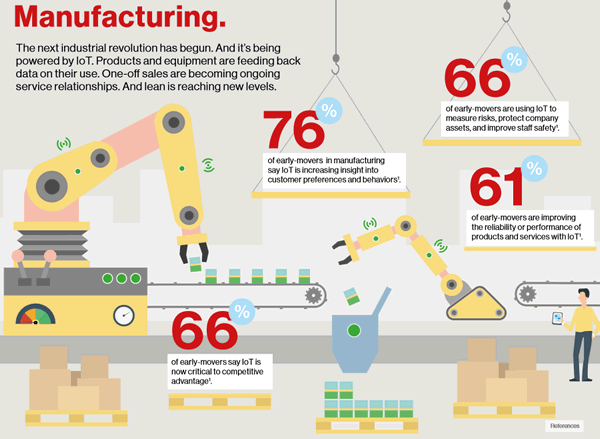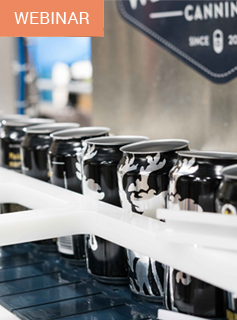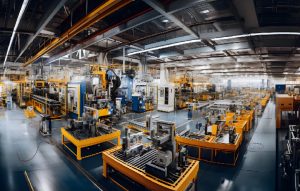Digitization is the driving force today, and it is changing the face of our world. The applications of the Internet of Things are apparent as we can see smart and connected systems in plenty of environments including but not limited to homes, hospitals, transportation, retail, logistics, and cities. All of these fields are revolutionized by IoT adoption and factories are no exception.
According to a recent estimation by McKinsey, the potential economic impact of IoT applications in 2025 is between US $3.9 and $11.1 trillion, of which $1.2 to $3.7 trillion is allotted to IoT applications within the factory environment.
The Internet of Things is a promising technology that offers enhanced efficiency and better quality to the manufacturing industry. So, our manufacturing plants and production lines are about to undergo some dramatic changes that will make them well-ordered.
What makes the Internet of Things so special? What are the benefits of IoT for the manufacturing industry? Let’s take a look at the answers to all of these questions:

The Internet of Things in manufacturing – source Verizon 2016
Reduced asset downtime
When we talk about manufacturing, production is at the core of this industry. The ability to produce high-quality products within a defined timeframe is what makes or breaks the deal for manufacturers. In such scenarios, sudden breakdown of critical assets can directly affect the production speed and result in lost revenue. When any machine fails, companies have to not only deal with the repairs, but also suffer loss of raw materials and associated production time. IoT can protect the company against such losses by immediately detecting decline in asset efficiency, thus forecasting the potential problems.
Upgraded product quality
One of the major reasons behind quality issues are faults in the equipment, either they are not calibrated as per the requirement or are not set accurately according to the parameters. What makes it worse is, most of the times, manufacturers are unaware of the error and come to know about it during the quality test or from customer feedback. Poor quality can severely hurt any manufacturer’s reputation, not to mention the cost and the resources that they might need to allocate in order to correct the issue. In such cases, IoT can serve the purpose, as it can help production managers to detect quality issues at an early stage and also provide them with insights to improve the quality of existing products.

How Industry 4.0 is a game changer for factory owners
Webinar agenda
- How Industry 4.0 is a game changer
- The role of IoT and data analytics in the manufacturing industry
- IT/OT Convergence: Why it’s important for IoT adoption
- Current market trends and value
- Smart factory: The evolution not revolution
- Demo and review of smart production line monitoring
- Q&A session
Supply chain management
Inventory management and supply chain management are the strengths of any business. If you are a business owner, your business needs IoT to manage your inventory management for replenishing stock, tracking costs of inventory, profits or forecasting prices, and demand. IoT in manufacturing can help your business to gain real-time supply chain information by monitoring products and materials as they move through the supply chain. IoT can also be used to connect manufacturing plants to the respective suppliers, keeping everyone on the same page when it comes to tracing interdependencies and manufacturing cycle times. This can help companies to reduce inventory and also reduce capital requirements.
Increase energy efficiency
One of the principal expenses for manufacturing companies is their energy bill, which highlights the overall energy consumption of the entire factory; however, it’s not possible to break down the bill to understand which assets are consuming more energy than usual. IoT can do exactly this for factories, empowering them to gain granular visibility into energy consumption and asset efficiency. Smart factories can gain energy consumption information that is specific to each device. This can help managers to identify underperforming assets and recognize opportunities for energy cost savings. It allows them to set a benchmark for energy consumption for a set of similar equipment and evaluate assets that don’t meet the benchmark.
Conclusion
In today’s competitive times, manufacturers are always striving for more; more production output, more efficient manufacturing processes, and more revenue. IoT implementation can provide them the much needed competitive edge and also help them to reach new heights of production proficiency.
If you think IoT is what your factories need, our Smart Factory solution and Smart Asset Monitoring solution are perfect for you. If you want to have a customized IoT solution that fits your business requirements, get in touch with our team.









